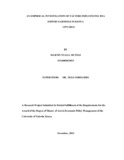| dc.description.abstract | Kenya’s tea export earnings have been fluctuating over time causing instability in the farmer’s earnings. The fluctuation in the earnings therefore justifies the need to identify the factors which influence the tea earnings with an aim of stabilizing them. The dependent variable was tea export earnings whereas the explanatory variables were exchange rate, inflation rate, foreign income, agriculture value addition, price of tea and volume of tea exported. The main objective of the study was to examine the factors that influence tea export earnings in Kenya for 40 years, running from 1973 to 2013. The specific objective was to estimate the significance of exchange rate, inflation rate, foreign income, agriculture value addition, price of tea and volume of tea exported in determining tea export earnings in Kenya. Various time series methods of regression including heteroscedasticity, multicollinearity, autocorrelation, stationarity and cointegration were used in the analysis. The results showed that the regression did well in regard to the goodness of fit with an R2 of 98.57 % implying that 98.57 % of the variation in the Tea export earnings was explained by the explanatory variables under study. The findings showed that in the long run, exchange rate, agriculture value addition, price of tea and volume of tea are significant in determining tea export earnings. Foreign income was found to be significant in determining export earnings in the short run. The study recommends legislation of laws that will enhance provision of inputs at subsidized rates and credit to tea growing areas so as to increase volume of tea produced in Kenya, for exports. In addition, there is need for marketing Kenyan tea to many foreign countries by the Ministry of Foreign Affairs and International Trade. Further, the government through the Competition Authority of Kenya should ensure anticompetitive conduct at Mombasa Tea Auction is removed so as to allow the market to determine the price for tea. With regard to value addition, the study recommends export of processed tea. With regard to exchange rate, the study recommends sound monetary and fiscal policies to cushion exchange rate from constant fluctuations. | en_US |

